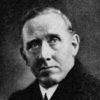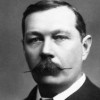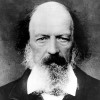Getting what you go after is success; but liking it while you are getting it is happiness.
Bertha Damon (1881-1975) American humorist, author, lecturer, editor [Bertha Clark Pope Damon]
A Sense of Humus, ch. 13 “Garden Sass” (1943)
(Source)
Quotations about:
journey
Note not all quotations have been tagged, so Search may find additional quotes on this topic.
It is by going down into the abyss
that we recover the treasures of life.Where you stumble,
there lies your treasure.The very cave you are afraid to enter
turns out to be the source of
what you are looking for.
The damned thing in the cave
that was so dreaded
has become the center.Joseph Campbell (1904-1987) American writer, professor of literature
In Diane K. Osbon, ed., Reflections on the Art of Living: A Joseph Campbell Companion, “In the Field” (1991)
(Source)
Quoted extensively, and mis-cited to a variety of Campbell's published works. I have not been able to confirm a primary source for it.
Tell us, where slopes the cliff, to make a way
That man may climb? For they who know its worth
Fret most when time is wasted in delay.[Ditene dove la montagna giace,
sì che possibil sia l’andare in suso;
ché perder tempo a chi più sa più spiace.]Dante Alighieri (1265-1321) Italian poet
The Divine Comedy [Divina Commedia], Book 2 “Purgatorio,” Canto 3, l. 76ff (3.76-78) (1314) [tr. Sayers (1955)]
(Source)
Virgil inquiring of the "Contumacious" (the rebellious and excommunicates who only sought the forgiveness of God at the end of their lives) the best route to climb the Mountain of Purgatory. He actually gets in a dig at them, as they are themselves delayed ascending the Mountain because of their delayed turn to Salvation.
(Source (Italian)). Alternate translations:
Shew, where with easier slope these mountains bend,
The MENTAL PROGRESS ill can bear a stand.
[tr. Boyd (1802), st. 15]
Instruct us where the mountain low declines,
So that attempt to mount it be not vain.
For who knows most, him loss of time most grieves.
[tr. Cary (1814)]
Tell us in what direction mountain lies --
If it be possible to climb its side?
Lost time the wisest find it worst to bide.
[tr. Bannerman (1850)]
Tell us upon what side the mountain slopes,
So that the going up be possible,
For to lose time irks him most who most knows.
[tr. Longfellow (1867)]
Tell us where the mountain falls, so that it is possible to go upward; for loss of time displeases most who most knows.
[tr. Butler (1885)]
Tell us where easiest slopes the precipice.
So that we there our upward path may hold:
Him who knows most time lost doth most displease.
[tr. Minchin (1885)]
Tell us, where the mountain lies so that the going up is possible; for to lose time is most displeasing to him who knows most.
[tr. Norton (1892)]
Tell us where the mountain slopes, so that it may be possible to go upward; for time lost irks him who knowest most.
[tr. Okey (1901)]
Tell us where the mountain slopes so that it is possible to go up; for loss of time most grieves him that knows best.
[tr. Sinclair (1939)]
Tell us where slopes the mountain by degrees
Such, that it may be possible to ascend;
For him who knows most lost hours most displease.
[tr. Binyon (1943)]
Tell us which way
leads to some slope by which we two may climb.
Who best knows time is most grieved by delay.
[tr. Ciardi (1961)]
Tell us where the mountain slopes so that it is possible to go up, for time lost irks him most who knows most.
[tr. Singleton (1973)]
Tell us where the mountain slopes enough
for us to start our climb: the more one learns,
the more one comes to hate the waste of time.
[tr. Musa (1981)]
Tell us where the mountain-side slopes so
That it is possible to go up higher;
For those who know most, dislike most to dawdle.
[tr. Sisson (1981)]
Please tell
us where the slope inclines and can be climbed;
for he who best discerns the worth of time
is most distressed whenever time is lost.
[tr. Mandelbaum (1982)]
Tell us where the mountain slopes so that it is possible to climb it; for losing time displeases most those who know most.
[tr. Durling (2003)]
Tell us where the mountain slopes allow us to go upwards, since lost time troubles those most, who know most.
[tr. Kline (2002)]
Please tell us where the mountain angles down
to make it possible for us to climb.
For those who know the most, most hate time lost.
[tr. Kirkpatrick (2007)]
Tell us where the mountain rises gently
so that we may begin the long ascent.
The more we know, the more we hate time's waste.
[tr. Hollander/Hollander (2007)]
Tell us where they bend, these mountain slopes,
So feet may find their way. A man of knowledge
Regrets the loss of time far more than most.
[tr. Raffel (2010)]
In short, I consider this world as a place which nature never designed for my permanent abode, and I look upon my departure out of it, not as being driven away from my habitation, but as leaving my inn.
[Et ex vita ita discedo tamquam ex hospitio, non tamquam e domo; commorandi enim natura devorsorium nobis, non habitandi dedit.]
Marcus Tullius Cicero (106-43 BC) Roman orator, statesman, philosopher
De Senectute [Cato Maior; On Old Age], ch. 23 / sec. 84 (23.84) (44 BC) [tr. Melmoth (1773)]
(Source)
(Source (Latin)). Alternate translations:
I departe me from this presente life as a walkyng weyfaryng man or as a voyagieng pilgryme departith from some lodgyng place or an hostellrye for to come to his owne dwellyng house. But I departe me not from this life as the lorde departeth from his owne house for this passable life is nowght ellys but as a lodgyng place or an hostellrye.
[tr. Worcester/Worcester/Scrope (1481)]
And I depart out of this life as out of an inn, and not out of a dwellinghouse. For nature hath given to us a lodging to remain and sojourn in for a time, and not to dwell in continually.
[tr. Newton (1569)]
And I depart out of this life, as from an Inne, not as from a continuall habitation; for nature hath given us a place to rest in, not to dwell in.
[tr. Austin (1648)]
Hence from an Inne, not from my home, I pass,
Since Nature meant us here no dwelling place.
[tr. Denham (1669)]
I have not frustrated the End of Nature, and am disposed to leave this life, with as much Indifference, as an Inn upon the Road; for Nature here intends us a Lodging only, not a Fixed Home or Settled Place of Habitation.
[tr. Hemming (1716)]
And now I go from this Life as from an Inn; for Nature hath given it us as a Place to rest in, but not for a continual Habitation.
[tr. J. D. (1744)]
And when the Close comes, I shall quit Life as I would an Inn, and not as a real Home. For Nature appears to me to have ordain'd this Station here for us, as a Place of Sojournment, a transitory Abode only, and not as a fixt Settlement or permanent Habitation.
[tr. Logan (1744)]
I depart out of life just as out of an inn, and not as out of my home. For Nature has given us an hotel to sojourn in, not a place to dwell in.
[Cornish Bros. ed. (1847)]
And from this life I depart as from a temporary lodging, not as from a home. For nature has assigned it to us as an inn to sojourn in, not a place of habitation.
[tr. Edmonds (1874)]
Yet I depart from life, as from an inn, not as from a home; for nature has given us here a lodging for a sojourn, not a place of habitation.
[tr. Peabody (1884)]
But I quit life as I would an inn, not as I would a home. For nature has given us a place of entertainment, not of residence.
[tr. Shuckburgh (1895)]
I now depart
As from a lodging; house, and not a home.
Nature has made this world a place in which
One stays a little, does not dwell for aye.
[tr. Allison (1916)]
And I quit life as if it were an inn, not a home. For Nature has given us an hostelry in which to sojourn, not to abide.
[tr. Falconer (1923)]
But what nature gives us is a place to dwell in temporarily, not one to make our own. When I leave life, therefore, I shall feel as if I am leaving a hostel rather than a home.
[tr. Grant (1960, 1971 ed.)]
And I am departing from life as from a temporary lodging, not as from a home. Yes, nature has given a spot where we may turn aside for a time, not a place of permanent residence.
[tr. Copley (1967)]
But I do feel as though I am leaving an inn, not my home. Nature has given us a place to stay for a while, but not for ever.
[tr. Cobbold (2012)]
I leave this life as I would leave
An inn and not a home. Nature
Gave us in fact a temporary hotel,
Not a permanent place in which to dwell.
[tr. Bozzi (2015)]
I depart from life as if from an inn, not a house. Nature gives us our bodies to abide in only for a time as guests, not to make our home.
[tr. Freeman (2016)]
And I am leaving life as if from an inn, not a home. For nature has given us a way-station for a brief delay, not to permanently reside.
[tr. @sentantiq (2018)]
And why carry out one’s projects, since the project is sufficient pleasure in itself?
[Et à quoi bon exécuter des projets, puisque le projet est en lui-même une jouissance suffisante?]
Charles Baudelaire (1821-1867) French poet, essayist, art critic
Le Spleen de Paris (Petits Poèmes en Prose), No. 24 “Projects [Les Projets],” final words (1869) [tr. Varèse (1970)]
(Source)
(Source (French)). Alternate translations:
And what is the good of carrying out a project, when the project itself gives me pleasure enough?
[tr. Hamburger (1946)]
And what good is it to carry out plans, since planning itself is a sufficient delight?
[tr. Kaplan (1989)]
And what good would it do to execute such plans, since planning is in itself sufficient enjoyment?
[tr. Waldrop (2009)]
What good is it to accomplish projects, when the project itself is enjoyment enough?
[Various]
Necessity brings him here, not pleasure.
[Necessità ‘l ci ‘nduce, e non diletto.]
Dante Alighieri (1265-1321) Italian poet
The Divine Comedy [Divina Commedia], Book 1 “Inferno,” Canto 12, l. 87 (12.87) [Virgil] (1309) [tr. Sinclair (1939)]
(Source)
Explaining why a living mortal is wandering around Hell. (Source (Italian)). Alternate translations:
Necessity, not Choice, has brought him here.
[tr. Rogers (1782)]
'Twas fate compell'd him, no profane delight.
[tr. Boyd (1802), st. 13]
Thereto induc’d
By strict necessity, not by delight.
[tr. Cary (1814)]
Nor pleasure draws us, but necessity.
[tr. Dayman (1843)]
Necessity brings him to it, and not sport.
[tr. Carlyle (1849)]
Necessity the cause, and not delight.
[tr. Bannerman (1850)]
Necessity compels him, not delight.
[tr. Johnston (1867)]
Necessity, and not delight, impels us.
[tr. Longfellow (1867)]
Necessity leads us on, and not enjoyment.
[tr. Butler (1885)]
Necessity compels us, not delight.
[tr. Minchin (1885)]
Necessity brings him hither and not delight.
[tr. Norton (1892)]
Necessity, not pastime, bringeth him to it.
[tr. Sullivan (1893)]
Necessity doth bring him here, not pastime.
[tr. Griffith (1908)]
Necessity brings him to it, and not whim.
[tr. Binyon (1943)]
Necessity brings him here, not sport nor jest.
[tr. Sayers (1949)]
Fate brings him here, not curiosity.
[tr. Ciardi (1954)]
Necessity brings him to it, and not sport.
[tr. Singleton (1970)]
He travels by necessity, not pleasure.
[tr. Musa (1971)]
Necessity has brought him here, not not pleasure.
[tr. Mandelbaum (1980)]
It is because he must come, not for amusement.
[tr. Sisson (1981)]
It is necessity,
And not pleasure, that puts him on this road.
[tr. Pinsky (1994), ll. 80-81]
Necessity induces us, and not pleasure.
[tr. Durling (1996)]
Necessity brings him here, and not desire.
[tr. Kline (2002)]
Necessity, not pleasure, leads us on.
[tr. Kirkpatrick (2006)]
Necessity compels us, not delight.
[tr. Hollander/Hollander (2007)]
He is brought
Here by necessity, not pleasure.
[tr. James (2013)]
Here’s a sigh to those who love me,
And a smile to those who hate;
And, whatever sky’s above me,
Here’s a heart for every fate.George Gordon, Lord Byron (1788-1824) English poet
“To Thomas Moore,” st. 2. (1817)
(Source)
First published in The Traveller (1821-01-08).
It is good to have an end to journey towards; but it is the journey that matters, in the end.
There is a pleasure unknown to the landsman in reading at sea.
We never see the entire stretch of the road from any one point. Life is not a long, straight path — the untrodden portion clearly visible — it is a winding and undulating lane. “Come on,” Life seems to say, showing us just one little bit of the track, “you can manage this — and now this — and now this again!” And those who can be persuaded to concentrate their flagging energies on each stretch as it unfolds itself find themselves standing at last, with glowing hearts and flushed faces, on the lonely and little trodden summit.
Frank W. Boreham (1871-1959) Anglo-Australian preacher
The Drums of Dawn, Part 2, ch. 5 “The White Giants” (1933)
(Source)
Blowing a gale all day. Nothing to do and we did it.
Arthur Conan Doyle (1859-1930) British writer and physician
Journal of Arctic voyage (19 Jul 1880)
(Source)
Sing to me of the man, Muse, the man of twists and turns …
driven time and again off course, once he had plundered
the hallowed heights of Troy.
Many cities of men he saw and learned their minds,
many pains he suffered, heartsick on the open sea,
fighting to save his life and bring his comrades home.[Ἄνδρα μοι ἔννεπε, Μοῦσα, πολύτροπον, ὃς μάλα πολλὰ
πλάγχθη, ἐπεὶ Τροίης ἱερὸν πτολίεθρον ἔπερσε·
πολλῶν δ’ ἀνθρώπων ἴδεν ἄστεα καὶ νόον ἔγνω,
πολλὰ δ’ ὅ γ’ ἐν πόντῳ πάθεν ἄλγεα ὃν κατὰ θυμόν,
ἀρνύμενος ἥν τε ψυχὴν καὶ νόστον ἑταίρων.]Homer (fl. 7th-8th C. BC) Greek author
The Odyssey [Ὀδύσσεια], Book 1, l. 1ff (1.1-5) (c. 700 BC) [tr. Fagles (1996)]
(Source)
Original Greek. Alternate translations:
The man, O Muse, inform, that many a way
Wound with his wisdom to his wished stay;
That wander’d wondrous far, when he the town
Of sacred Troy had sack’d and shiver’d down;
The cities of a world of nations,
With all their manners, minds, and fashions,
He saw and knew; at sea felt many woes,
Much care sustain’d, to save from overthrows
Himself and friends in their retreat for home;
But so their fates he could not overcome.
[tr. Chapman (1616)]
Tell me, O Muse, th’ adventures of the man
That having sack’d the sacred town of Troy,
Wander’d so long at sea; what course he ran
By winds and tempests driven from his way:
That saw the cities, and the fashions knew
Of many men, but suffer’d grievous pain
To save his own life, and bring home his crew.
[tr. Hobbes (1675)]
The man for wisdom's various arts renown'd,
Long exercised in woes, O Muse! resound;
Who, when his arms had wrought the destined fall
Of sacred Troy, and razed her heaven-built wall,
Wandering from clime to clime, observant stray'd,
Their manners noted, and their states survey'd,
On stormy seas unnumber'd toils he bore,
Safe with his friends to gain his natal shore.
[tr. Pope (1725)]
Muse make the man thy theme, for shrewdness famed
And genius versatile, who far and wide
A Wand’rer, after Ilium overthrown,
Discover’d various cities, and the mind
And manners learn’d of men, in lands remote.
He num’rous woes on Ocean toss’d, endured,
Anxious to save himself, and to conduct
His followers to their home.
[tr. Cowper (1792)]
Sing me, O Muse, that hero wandering
Who of men's minds did much experience reap,
And knew the citied realms of many a king,
Even from the hour he smote the Trojan keep.
Also a weight of sorrows in the deep
Brooding he bore, in earnest hope to save,
'Mid hard emprise and labour all too steep,
Himself and comrades from a watery grave --
Whom yet he rescued not with zeal nor yearnings brave.
[tr. Worsley (1861), st. 1]
Tell me, O Muse, declare to me that man
Tost too and fro by fate, who, when his arms
Had laid Troy's holy city in the dust,
Far wand'ring roam'd on many a tribe of men
To bend his gaze, their minds and thoughts to learn.
Grief upon grief encounter'd he, when, borne
On ocean-waves, his life he carried off
A prize from perils rescued, and would fain
Have homeward led his brethren in arms.
[tr. Musgrave (1869)]
Tell me, oh Muse, of the many-sided man,
Who wandered far and wide full sore bestead,
When had razed the mighty town of Troy:
And of many a race of human-kind he saw
The cities; and he learned their mind and ways:
And on the deep fully many a woe he bore
In his own bosom, while he strove to save
His proper life, and his comrades' home-return.
[tr. Bigge-Wither (1869)]
Tell me, Muse, of that man, so ready at need, who wandered far and wide, after he had sacked the sacred citadel of Troy, and many were the men whose towns he saw and whose mind he learnt, yea, and many the woes he suffered in his heart upon the deep, striving to win his own life and the return of his company. Nay, but even so he saved not his company, though he desired it sore.
[tr. Butcher/Lang (1879)]
Tell me, O Muse, of the Shifty, the man who wandered afar,
After the Holy burg, Troy-town, he had wasted with war:
He saw the towns of menfolk, and the mind of men did he learn;
As he warded his life in the world, and his fellow-farers' return,
Many a grief of heart on the deep-sea flood he bore,
Nor yet might he save his fellows, for all that he longed for it sore.
[tr. Morris (1887)]
Speak to me, Muse, of the adventurous man who wandered long after he sacked the sacred citadel of Troy. Many the men whose towns he saw, whose ways he proved; and many a pang he bore in his breast at sea while struggling for his life and his men's safe return.
[tr. Palmer (1891)]
Tell me, oh Muse, of that ingenious hero who travelled far and wide after he had sacked the famous town of Troy. Many cities did he visit, and many were the nations with whose manners and customs he was acquainted; moreover he suffered much by sea while trying to save his own life and bring his men safely home.
[tr. Butler (1898)]
Tell me, O Muse, of that many-sided hero who traveled far and wide after he had sacked the famous town of Troy. Many cities did he visit, and many were the people with whose customs and thinking he was acquainted; many things he suffered at sea while seeking to save his own life and to achieve the safe homecoming of his companions.
[tr. Butler (1898), rev. Power/Nagy]
That man, tell me O Muse the song of that man, that versatile man, who in very many ways veered from his path and wandered off far and wide, after he had destroyed the sacred citadel of Troy. Many different cities of many different people did he see, getting to know different ways of thinking. Many were the pains he suffered in his heart while crossing the sea struggling to merit the saving of his own life and his own homecoming as well as the homecoming of his comrades.
[tr. Butler (1898), rev. Kim/McCray/Nagy/Power (2018)]
Tell me, O Muse, of the man of many devices, who wandered full many ways after he had sacked the sacred citadel of Troy. Many were the men whose cities he saw and whose mind he learned, aye, and many the woes he suffered in his heart upon the sea, seeking to win his own life and the return of his comrades.
[tr. Murray (1919)]
O Divine Poesy,
Goddess-daughter of Zeus,
Sustain for me
This song of the various-minded man,
Who after he had plundered
The innermost citadel of hallowed Troy
Was made to stray grievously
About the coasts of men,
The sport of their customs good or bad,
While his heart
Through all the seafaring
Ached in an agony to redeem himself
And bring his company safe home.
[tr. Lawrence (1932)]
Sing in me, Muse, and through me tell the story
of that man skilled in all ways of contending,
the wandering, harried for years on end after he plundered the stronghold
on the proud height of Troy.
He saw the townlands
and learned the minds of many distant men,
and weathered many bitter nights and days
in his deep heart at sea, while he fought only
to save his life, to bring his shipmates home.
[tr. Fitzgerald (1961)]
Tell me, Muse, of the man of many ways, who was driven
far journeys after he had sacked Troy's sacred citadel.
Many were they whose cities he saw, whose minds he learned of,
many the pains he suffered in his spirit on the wide sea,
struggling for his own life and the homecoming of his companions.
[tr. Lattimore (1965)]
Muse, tell me of the man of many wiles,
the man who wandered many paths of exile
after he sacked Troy's sacred citadel.
He saw the cities -- mapped the minds -- of many;
and on the sea, his spirit suffered every
adversity -- to keep his life intact;
to bring his comrades back.
[tr. Mandelbaum (1990)]
Speak, Memory -- Of the cunning hero,
The wanderer, blown off course time and again
After he plundered Troy's sacred heights. Speak
Of all the cities he saw , the minds he grasped,
The suffering deep in his heart at sea
As he struggled to survive and bring his men home.
[tr. Lombardo (2000)]
Tell me, Muse, of the man versatile and resourceful, who wandered many a sea-mile afer he ransacked Troy's holy city. Many the men whose towns he observed, whose minds he discovered, many the pains in his heart he suffered, traversing the seaway, fighting for his own life and a way back home for his comrades.
[tr. Merrill (2002)]
Tell me, Muse, the story of that resourceful man who was driven to wander far and wide after he had sacked the holy citadel of Troy. He saw the cities of many people and he learnt their ways. He suffered great anguish on the high seas in his struggles to preserve his life and bring his comrades home.
[tr. DCH Rieu (2002)]
Tell me, Muse, of the man of many turns, who was driven
far and wide after he had sacked the sacred city of Troy.
Many were the men whose cities he saw, and learnt their minds,
many the sufferings on the open sea he endured in his heart,
struggling for his own life and his companions' homecoming.
[tr. Verity (2016)]
Tell me about a complicated man.
Muse, tell me how he wandered and was lost
when he had wrecked the holy town of Troy,
and where he went, and who he met, the pain
he suffered in the storms at sea, and how
he worked to save his life and bring his men
back home.
[tr. Wilson (2017)]
The man, Muse -- tell me about that resourceful man, who wandered
far and wide, when he'd sacked Troy's sacred citadel:
many men's townships he saw, and learned their ways of thinking,
many the griefs he suffered at heart on the open sea,
battling for his own life and his comrades' homecoming.
[tr. Green (2018)]
Muse, speak to me now of that resourceful man
who wandered far and wide after ravaging
the sacred citadel of Troy. He came to see
many people’s cities, where he learned their customs,
while on the sea his spirit suffered many torments,
as he fought to save his life and lead his comrades home.
[tr. Johnston (2019)]
Why do you go away? So that you can come back. So that you can see the place you came from with new eyes and extra colors. And the people there see you differently, too. Coming back to where you started is not the same as never leaving.
Therefore, when the young die I am reminded of a strong flame extinguished by a torrent; but when old men die it is as if a fire had gone out without the use of force and of its own accord, after the fuel had been consumed; and, just as apples when they are green are with difficulty plucked from the tree, but when ripe and mellow fall of themselves, so, with the young, death comes as a result of force, while with the old it is the result of ripeness. To me, indeed, the thought of this “ripeness” for death is so pleasant, that the nearer I approach death the more I feel like one who is in sight of land at last and is about to anchor in his home port after a long voyage.
[Itaque adulescentes mihi mori sic videntur, ut cum aquae multitudine flammae vis opprimitur, senes autem sic, ut cum sua sponte nulla adhibita vi consumptus ignis exstinguitur; et quasi poma ex arboribus, cruda si sunt, vix evelluntur, si matura et cocta, decidunt, sic vitam adulescentibus vis aufert, senibus maturitas; quae quidem mihi tam iucunda est, ut, quo propius ad mortem accedam, quasi terram videre videar aliquandoque in portum ex longa navigatione esse venturus.]
Marcus Tullius Cicero (106-43 BC) Roman orator, statesman, philosopher
De Senectute [Cato Maior; On Old Age], ch. 19 / sec. 71 (19.71) (44 BC) [tr. Falconer (1923)]
(Source)
(Source (Latin)). Alternate translations:
And by that the adolescentes & yong men as me semyth dyen like as old men which quencheth a strong & a right grete fflame of fyre by castyng in of moche watir, and olde men dyen as a fyre which stynteth and wasteth itself or as a candel & the matche in a lampe of oyle consumith withoute doyng violence & withoute any force & strength. I make eftsonys anothir comparison of deth whiche comyth both to yong & olde men ffor as the appils & othir fruytes hangyng on the trees be by force plucked in the meanetyme whiles they be rawe & newe & when they be ripe & melowe by the heete of the sonne they fallen of with their free & playne will & so the deth takith awey by hir violente force the life of yong men and the ripnesse of olde age takith awey the life of olde men softely and withoute force. And this deth whiche comith by ripnesse of long age is so ioyfull and so agreable to me in so moche as I shall applye and come more nygh to it in a convenient season. The deth is also to me noon othirwise ioyfull or agreable than shuld be to me the deye londe if me thought that I shulde see it when I seyle in a ship or swymme in the see to the porte or havyn. And that it were likly that I shuld come to the porte or havyn aftir that I have sey∣led and vyaged long upon the see. That is to witt that deth which comith to the wise man aftir long age is like the porte or haven that men see from ferr in seylyng upon the see whiche doth grete ioye when men be upon the river into the haven warde and to have takyn their porte salve ffor the drede of the parelles and dangers of rokkes sandys and grete tempestys be than passid chaungid and turned in saftee and rest.
[tr. Worcester/Worcester/Scrope (1481)]
Therefore, young men, in mine opinion, seem so to die as when a raging and violent flame of fire is quenched, with a great quantity or effusion of water; but old men die as if it were fire, which, lacking wood and cumbustible matter to nourish it, goeth out quietly and is quenched, as though it were of his own accord, not forcibly. And as apples which are green and unripe are not plucked from the tree but by a certain violent plucking, but if they be ripe and mellow they fall voluntarily down from teh tree; so likewise, young men depart out of their life by violent force and painful struggling, but old men die by a certain ripeness and maturity. And as often as I think thereon, I am rapt with such joy and comfort, that the nearer I draw and approach to death, the sooner, methink, I see the dry land, and (as it were, afer a long navigation and seafaring voyage) shall at length arrive at the quiet haven ahd port of all rest and security.
[tr. Newton (1569)]
Therefore a young man seemeth to me to die like fire put out with water, but old men like fire which being put out by no force, is quietly consumed of it selfe; and as apples on trees being not ripe, are plucked of by violence, but being ripe they fall of themselves: so force taketh away the life of young men, but ripenesse of age the life of old men: which consideration is so pleasant to me, that I seem to behold the earth, as a quiet port, whither after a long and troublesome navigation I shall arrive.
[tr. Austin (1648), ch. 21]
All things which Nature did ordain, are good,
And so must be receiv'd, and understood,
Age, like ripe Apples, on earth's bosom drops,
Whil'st force our youth, like fruits untimely crops;
The sparkling flame of our warm blood expires,
As when huge streams are pour'd on raging fires,
But age unforc'd falls by her own consent,
As Coals to ashes, when the Spirit's spent;
Therefore to death I with such joy resort,
As Seamen from a Tempest to their Port.
[tr. Denham (1669)]
For this Reason, I think it not so improper, to compare the Death of Youth to Flames extinguished, by a violent and suddain Splash of Water; and that of Riper Years, to such a Fire, as without any Violence, goes out, when all its Fewel is decayed and spent. And as Fruit, when it is green, is torn and plucked with Violence from the Boughs, which, when become more ripe and mellow, falls gently of it self: so Youth departs this Life with Violent Strugles, while Old Age drops off mature with Years. And indeed the Prospect of this is so far from being unpleasant, that the nearer it is, the more delightful does it seem: nor is it less grateful, than the Sight of land can be to one, quite tired with a long and tedious Voyage.
[tr. Hemming (1716)]
Thus the Youthful seem, I think, to die like Fire forcibly quench'd with Water, whereas the Aged go smoothly off, and like the Fire burnt to the last Spark, need no Force to be extinguished; or as green Fruit which must be plucked from the Trees, but when ripe falls off it self. Thus do the Young die with Repugnancy, and the Old fall with Maturity. So that Life becomes the pleasanter to me, the nearer I approach its End, thinking to myself the Earth is my Harbour, into which I shall arrive, after a long and tedious Voyage.
[tr. J. D. (1744)]
For Young Men seem to be forced from Life, as Fires are extinguished by great Quantities of Water thrown on them; when on the contrary, Old Men expire of themselves, like a Flame when all its Fuel is spent. And as unripe Fruit requires some Force to part it from its native Bough; but when come to full Maturity, it drops of itself, without any Hand to touch it: So Young People die by something violent or unnatural; but the Old by mere Ripeness. The Thoughts of which to me are now become so agreeable, that the nearer I draw to my End, it seems like discovering the Land at Sea, that, after the Tossings of a tedious and stormy Voyage, will yield me a safe and quiet Harbour.
[tr. Logan (1744)]
In the latter instance [youth]; the privation of life may be resembled to a fire forcibly extinguished by a deluge of water; in the former [an old man], to a fire spontaneously and gradually going out from a total consumption of its fuel. Or, to have recourse to another illustration; as fruit before it is ripe cannot, without some degree of force, be separated from the stalk, but drops of itself when perfectly mature; so the disunion of the soul and body is effected in the young by dint of violence, but is wrought in the old by a mere fullness and completion of years. This ripeness for death I perceive in myself with much satisfaction; and I look forward to my dissolution as to a secure haven, where I shall at length find a happy repose from the fatigues of a long voyage.
[tr. Melmoth (1773)]
Therefore young men seem to me to die just as when the force of flame is suddenly overpowered by a mass of water; but old men, just as fire that is spent is extinguished of itself, no violence having been applied to it. And, as apples are pulled from trees by force, if they are unripe; if ripe and mellowed, they fall down; so force takes away life from young men, maturity from old men; which maturity to me, indeed, is so pleasant, that the nearer I approach to death, I seem, as it were, to behold land, and to be about to come, at length, into port form a long voyage.
[Cornish Bros. ed. (1847)]
And thus it is that young men seem to me to die, just as when the violence of flame is extinguished by a flood of water; whereas old men die, as the exhausted fire goes out, spontaneously, without the exertion of any force: and as fruits when they are green are plucked by force from the trees, but when ripe and mellow drop off, so violence takes away their lives from youths, maturity from old men; a state which to me indeed is so delightful, that the nearer I approach to death, I seem as it were to be getting sight of land, and at length, after a long voyage, to be just coming into harbour.
[tr. Edmonds (1874)]
Thus young men seem to me to die as when a fierce flame is extinguished by a stream of water; while old men die as when a spent fire goes out of its own accord, without force employed to quench it. Or, as apples, if unripe, are violently wrenched from the tree, while, mature and ripened, they fall, so force takes life from the young, maturity from the old; and this ripeness of old age is to me so pleasant, that, in proportion as I draw near to death, I seem to see land, and after a long voyage to be on the point of entering the harbor.
[tr. Peabody (1884)]
Accordingly, the death of young men seems to me like putting out a great fire with a deluge of water; but old men die like a fire going out because it has burnt down of its own nature without artificial means. Again, just as apples when unripe are torn from trees, but when ripe and mellow drop down, so it is violence that takes life from young men, ripeness from old. This ripeness is so delightful to me, that, as I approach nearer to death, I seem as it were to be sighting land, and to be coming to port at last after a long voyage.
[tr. Shuckburgh (1895)]
The death of the young seems to me to resemble the sudden extinction of a flame with volumes of water; the old seem rather to die as a fire which flickers out of itself.
[ed. Harbottle (1906)]
To them it comes
It seems to me, as when a fire is quenched
By streams of water: to the old it comes
As when a fire dies slowly down itself:
Just so the apples, when unripe, are torn
With violence from the boughs: if ripe with age
They gently fall: and so the life of youth
Is taken by some violent attack;
The old man's troublous age comes gently to an end.
To me this seems so pleasant, that I feel
The nearer that I draw towards the end,
I sight the land, and see before my eyes
The harbour waiting to receive the bark
Which long as voyaged on the toilsome sea.
[tr. Allison (1916)]
It seems to me that the death of a young man is like the drowning of a blazing flame by a flood of water, whereas the death of the old is like the gradual, utterly gentle and spontaneous flickering out of a fire that has used up its fuel. Fruits, too, if they are green, must be forcefully pulled from the bough, but if they are ripe and mellow, they drop off. So it is with the life of man: from the young, it is taken by violence, from the old, by the fullness of time. This is a thought that gives me great comfort; as I come closer and closer to death, I seem, so to speak, to see the land and to be at last about to come into harbor after a long sea-journey.
[tr. Copley (1967)]
Death at an early age seems to me like a fire that has suddenly been swamped by a bucket of water; but death in old age is like a fire that has not been extinguished but has gone out of its own accord, because it has used up all its fuel. When an apple is not yet ripe, it takes some work to tug it off the branch; but when it is fully ripe, it simply falls to the ground. In the same way, though some act of violence may snatch life from the young, the old are ready to die. And that to me is a pleasant thought -- so much so that the nearer I get to death, the more I feel like a sailor who, after a long voyage, has made landfall and is about to tie up in his home port.
[tr. Cobbold (2012)]
When a young person dies, it seems to me to be like a vigorous flame being put out by a fire hose; with old people, on the other hand, the flame is extinguished, having burned itself out on its own accord with no violent outside force. When unripe apples are plucked from trees it takes real force, but the mature and mellow ones fall gently and naturally. Violence carries life away from the young, from the old it is ripeness. And, you know, the ripeness is so pleasant to me that the nearer I approach death, the more I see it as land and that at last I am about to come into port after a long voyage.
[tr. Gerberding (2014)]
Therefore young people, it seems to me, pass
Away like tall flames put out by a large mass
Of water while old men die out like the fumes
Of an unquenchable fire which consumes
Itself without recourse to another force.
And just as unripe fruits are hard to pluck
From the trees to which they’re closely stuck,
But once mature and fully grown
Drop down to the ground on their own,
So young lives are cut down by ferocity
While old ones are spent by maturity.
A maturity to me so suave
The nearer I get to the grave.
It also seems to me as though
I were almost shouting land-ho!
On reaching the port of destination
After a very long navigation.
[tr. Bozzi (2015)]
A young person dying reminds me of a fire extinguished by a deluge. But when an old person dies, it is like a flame that diminishes gradually and flickers away of its own accord with no force applied after its fuel has been used up. In the same way, green apples are hard to pick from a tree, but when ripe and ready they fall to the ground by themselves. So death comes to the young with force, but to the old when the time is right. To me there is great comfort in this idea, so that as death grows nearer, the more I feel like a traveler who at last sees the land of his home port after a long voyage.
[tr. Freeman (2016)]
In relation to his public, the artist of to-day […] walks at first with his companions, till one day he falls through a hole in the brambles, and from that moment is following the dark rapids of an underground river which may sometimes flow so near the surface that the laughing picnic parties are heard above, only to re-immerse itself in the solitude of the limestone and carry him along its winding tunnel, until it gushes out through the misty creeper-hung cave which he has always believed to exist, and sets him back in the sun.
Cyril Connolly (1903-1974) English intellectual, literary critic and writer.
“Writers and Society, 1940-3” (1943), The Condemned Playground (1946)
(Source)
Any experience deeply felt makes some men better and some men worse. When it has ended, they share nothing but the recollection of a commitment in which each was tested and to some degree found wanting. They were not alike when they began, and they were not alike when they finished. […] The consequences of the journey change the voyager so much more than the embarking or the arrival.
Murray Kempton (1917-1997) American journalist.
Part of Our Time: Some Ruins & Monuments of the Thirties, “A Prelude” (1955)
(Source)
How do you expect to arrive at the end of your own journey if you take the road to another man’s city? How do you expect to reach your own perfection by leading somebody else’s life?
Thomas Merton (1915-1968) French-American religious and writer [a.k.a. Fr. M. Louis]
New Seeds of Contemplation, ch. 14 “Integrity” (1962)
(Source)
You unlock this door with the key of imagination. Beyond it is another dimension: a dimension of sound, a dimension of sight, a dimension of mind. You’re moving into a land of both shadow and substance, of things and ideas. You’ve just crossed over into — the Twilight Zone.
Rod Serling (1924-1975) American screenwriter, playwright, television producer, narrator
Twilight Zone, Introduction, Seasons 4-5 (1963-1964)
(Source)
“Is the Master out of his mind?” she asked me.
I nodded.
“And he’s taking you with him?”
I nodded again.
“Where?” she asked.
I pointed towards the centre of the earth.
“Into the cellar?” exclaimed the old servant.
“No,” I said, “farther down than that.”
Jules Verne (1828-1905) French novelist, poet, playwright
Journey to the Center of the Earth (1864)
(Source)
I have said time and again there is no place on this earth to which I would not travel, there is no chore I would not undertake if I had any faintest hope that, by so doing, I would promote the general cause of world peace.
The Road goes ever on and on
Down from the door where it began.
Now far ahead the Road has gone,
And I must follow, if I can,
Pursuing it with eager feet,
Until it joins some larger way,
Where many paths and errands meet.
And whither then? I cannot say.J.R.R. Tolkien (1892-1973) English writer, fabulist, philologist, academic [John Ronald Reuel Tolkien]
The Lord of the Rings, Vol. 1: The Fellowship of the Ring, Book 1, ch. 1 “A Long-expected Party” (1954)
(Source)
Sung by Bilbo as he leaves Bag End. Two chapters later, Frodo sings the same song when walking with Sam, Merry, and Pippin, but substitutes "weary" for "eager."
Every mile is two in winter.
George Herbert (1593-1633) Welsh priest, orator, poet.
Jacula Prudentum, or Outlandish Proverbs, Sentences, &c. (compiler), # 949 (1640 ed.)
(Source)
The gates of hell are open night and day;
Smooth the descent, and easy is the way:
But to return, and view the cheerful skies,
In this the task and mighty labor lies.[Facilis descensus Averno:
Noctes atque dies patet atri ianua Ditis;
Sed revocare gradum superasque evadere ad auras,
Hoc opus, hic labor est.]Virgil (70-19 BC) Roman poet [b. Publius Vergilius Maro; also Vergil]
The Aeneid [Ænē̆is], Book 6, l. 126ff (6.126-129) [The Sybil] (29-19 BC) [tr. Dryden (1697)]
(Source)
(Source (Latin)). Alternate translations:
To hel's an easie way,
Black Pluto's gates stand open night and day,
But to return, and the bright aire to view,
This is the worke, the labour of a few.
[tr. Ogilby (1649)]
Easy is the path that leads down to hell; grim Pluto's gate stands open night and day: but to retrace one's steps, and escape to the upper regions, this is a work, this is a task.
[tr. Davidson/Buckley (1854)]
The journey down to the abyss
Is prosperous and light:
The palace-gates of gloomy Dis
Stand open day and night:
But upward to retrace the way
And pass into the light of day,
There comes the stress of labour; this
May task a hero's might.
[tr. Conington (1866)]
Easy the way
Down to Avernus; night and day the gates
Of Dis stand open. But to retrace thy steps
And reach the upper air, -- here lies the task,
The difficulty here.
[tr. Cranch (1872)]
Easy is the descent into hell; all night and day the gate of dark Dis stands open; but to recall thy steps and issue to upper air, this is the task and burden.
[tr. Mackail (1885)]
Avernus' road is easy faring down;
All day and night is open wide the door of Dis the black;
But thence to gain the upper air, and win the footsteps back,
This is the deed, this is the toil.
[tr. Morris (1900)]
Down to Avernus the descent is light,
The gate of Dis stands open day and night.
But upward thence thy journey to retrace,
There lies the labour; 'tis a task of might.
[tr. Taylor (1907), st. 19, l. 166ff]
The downward path to death
Is easy; all the livelong night and day
Dark Pluto's door stands open for a guest.
But O! remounting to the world of light,
This is a task indeed, a strife supreme.
[tr. Williams (1910)]
Easy is the descent to Avernus: night and day the door of gloomy Dis stands open; but to recall thy steps and pass out to the upper air, this is the task, this the toil!
[tr. Fairclough (1916)]
By night, by day, the portals of dark Dis
Stand open: it is easy, the descending
Down to Avernus. But to climb again,
To trace the footsteps back to the air above,
There lies the task, the toil.
[tr. Humphries (1951)]
The way to Avernus is easy;
Night and day lie open the gates of death's dark kingdom:
But to retrace your steps, to find the way back to daylight --
That is the task, the hard thing.
[tr. Day-Lewis (1952)]
Easy
the way that leads into Avernus: day
and night the door to darkest Dis is open.
But to recall your steps, to rise again
into the upper air; that is the labor;
that is the task.
[tr. Mandelbaum (1971), l. 175ff]
The way downward is easy from Avernus.
Black Dis's door stands open night and day.
But to retrace your steps to heaven's air,
There is the trouble, there is the toil.
[tr. Fitzgerald (1981)]
It is easy to go down to the underworld. The door of black Dis stands open night and day. But to retrace your steps and escape to the upper air, that is the task, that is the labor.
[tr. West (1990)]
The path to hell is easy:
black Dis’s door is open night and day:
but to retrace your steps, and go out to the air above,
that is work, that is the task.
[tr. Kline (2002)]
The road down
To Avernus is easy. Day and night
The door to black Dis stands open.
But to retrace your steps and come out
To the upper air, this is the task,
The labor.
[tr. Lombardo (2005)]
The descent to the Underworld is easy.
Night and day the gates of shadowy Death stand open wide,
but to retrace your steps, to climb back to the upper air --
there the struggle, there the labor lies.
[tr. Fagles (2006), l. 149ff]
It's easy to descend into Avernus
Night and day the door of dusky Dis lies open.
To trace your steps and see the light again:
here's the toil and effort.
[tr. Bartsch (2021)]
It is easy to go down into Hell;
Night and day, the gates of dark Death stand wide;
But to climb back again, to retrace one's steps to the upper air --
There's the rub, the task.
[Source]
Let us go singing as far as we go: the road will be less tedious.
[Cantantes licet usque (minus via laedit) eamus.]
Virgil (70-19 BC) Roman poet [b. Publius Vergilius Maro; also Vergil]
Eclogues [Eclogae, Bucolics, Pastorals], No. 9 “Lycidas and Moeris,” l. 64ff (9.64) [Lycidas] (42-38 BC)
(Source)
(Source (Latin)). Alternate translations:
Singing lets goe, the way shall better please.
[tr. Ogilby (1649)]
A Song will help the beating Storm to bear.
[tr. Dryden (1709), l. 89]
Light song will ease the road of half its care.
[tr. Wrangham (1830), l. 76]
Yet we may still go on singing; the way will be less tedious.
[tr. Davidson (1854)]
Singing let us journey on --
(The way will seem less tedious).
[tr. Calverley (c. 1871)]
We may as well sing -- it makes the journey less irksome.
[tr. Wilkins (1873)]
Move on, and should the way seem long,
Shorten the distance with a song.
[tr. King (1882), ll. 915-916]
Walk on, and make
The road less tedious with our verse.
[tr. Palmer (1883)]
Then singing let us go,
our way to lighten.
[tr. Greenough (1895)]
Let us go on still singing; the way is less tedious.
[tr. Bryce (1897)]
We may go singing all the way, and the road weary us the less.
[tr. Mackail (1899)]
Let us go singing to beguile our way.
[tr. Mackail/Cardew (1908)]
Let us go forward singing, for the path
Tires us less so.
[tr. Williams (1915)]
We may yet go singing on our way -- it makes the road less irksome.
[tr. Fairclough (Loeb) (1916)]
Let us sing carols all the way: 'twill be
Less tedious.
[tr. Royds (1922)]
Why not go forward singing all the way? It makes the going easier.
[tr. Rieu (1949)]
We still may sing as we go and lighten the journey.
[tr. Johnson (1960)]
We can press on,
Singing as we go: a song lightens a long road.
[tr. Day Lewis (1963), ll. 63-64]
Let's keep on going, but singing as we go.
Sing makes the journey easier.
[tr. Ferry (1999)]
We might go along singing (the road will be less tedious).
[tr. Kline (2001)]
Oh, what more sweet than when, from care set free,
The spirit lays its burden down, and we,
With distant travel spent, come home and spread
Our limbs to rest along the wished-for bed.[O quid solutis est beatius curis,
cum mens onus reponit, ac peregrino
labore fessi venimus larem ad nostrum,
desideratoque acquiescimus lecto?]Catullus (c. 84 BC – c. 54 BC) Latin poet [Gaius Valerius Catullus]
Carmina # 31 “To Sirmio,” ll. 7-10 [tr. T. Martin (1861)]
(Source)
Sirmio was the peninsula where his country villa was built, present-day Sirmione on Lago di Garda.
(Source (Latin)). Alternate translations:
O, what so sweet as cares redress'd!
When the tir'd mind lays down its load;
When, with each foreign toil oppress'd,
We reach at length our own abode;
On our own wish'd-for couch recline,
And taste the bliss of sleep divine!
[tr. Nott (1795), # 28]
Then when the mind its load lays down;
When we regain, all hazards past,
And with long ceaseless travel tired,
Our household god again our own;
And press in tranquil sleep at last
The well-known bed so oft desired.
[tr. Lamb (1821)]
Sweetest of sweets to me that pastime seems,
When the mind drops her burden: when -- the pain
Of travel past -- our own cot we regain
And nestle on the pillow of our dreams.
[tr. Calverley (1862)]
Oh! what more blessèd than to find
Release from all our cares!
When layeth down the weary mind
The burden that it bears:
When, all our toil of travel o'er,
Our hearth again we tread,
And lay us down in peace once more
On the long-wish'd-for bed.
[tr. Cranstoun (1867)]
Days of happiness and bless,
What in life can match with this?
When with lightened heart the mind
Care and sorrow leaves behind,
And our weary wanderings o'er,
We have reached our own loved door,
And so no more abroad to roam,
Taste the dear delights of home.
[tr. Bliss (1872)]
Is there a scene more sweet than when
our clinging cares are undercase,
And, worn by alien moils and men,
The long untrodden sill repassed,
We press the kindly couch at last,
And find a full repayment there?
[tr. Hardy (1887)]
Oh what more blessèd be than cares resolved,
When mind casts burthen and by peregrine
Work over wearied, lief we hie us home
To lie reposing in the longed-for bed!
[tr. Burton (1893)]
O what greater blessing than cares released, when the mind casts down its burden, and when wearied with the toil of travel we reach our hearth, and rest in the long-for bed.
[tr. Smithers (1894)]
To think, O joy! that once again
I should be here upon my native soil!
At ease! O guerdon sweet! when, after wars,
With journeyings and vigils sore bestead,
Our own old home we come to, and the bed
So often longed for under alien stars.
[tr. Harman (1897)]
Ah , what is more blessed than to put cares away, when the mind lays by its burden, and tired with labour of far travel we have come to our own home and rest on the couch we longed for.
[tr. Warre Cornish (1904)]
O what is sweeter than when loosed from care, when the mind throws down its burden, way-worn we reach our own hearth and at last find repose in the bed we have so often longed for.
[tr. Stuttaford (1912)]
Oh, what is sweeter than, when toil is past,
To come back home, the mind care-free at last,
The foreign labors done, the rest well-earned,
To seek the welcome couch for which we've yearned?
[tr. Stewart (1915)]
What joys so keen as all one's cares to shed,
To ease the burdened mind, no more to roam,
All travel-worn to reach th' ancestral home,
And rest at length in the long looked for bed.
[tr. Symons-Jeune (1923)]
Joy beyond joy to loose the cares that chafe
And lay aside the burden of the mind!
Home after toilsome travel, home once more,
Snug in the cosy bed we wearied for.
[tr. MacNaghten (1925)]
Can there be more joy than this
To throw off the chains of office and in calm domestic bliss,
Wearied with the strain of travel, once again to rest my head,
Full reward of all my labours, in my dear, my longed-for bed?
[tr. Wright (1926)]
After many months of travel, nothing's better than to rest, relaxed and careless; sleep is heaven in our own beloved bed.
[tr. Gregory (1931)]
For what can be more blissful than to ease
One's troubles, when the mind puts off its load
And I return, all care-worn, to my hearth
And sleep in the bed I've longed for?
[tr. Hollander (1976)]
What could be better? Every care dissolving, shedding the burden of an exhausting journey, back home among the gods of our own household we find at last the couch, the rest we desired!
[tr. C. Martin (1979)]
O what freedom from care is more joyful
than when the mind lays down its burden,
and weary, back home from foreign toil,
we rest in the bed we longed for?
[tr. Kline (2001)]
What greater bliss than when, cares all dissolved,
the mind lays down its burden, and, exhausted
by our foreign labors we at last reach home
and sink into the bed we've so long yearned for?
[tr. Green (2005)]
O what is happier than worries released,
when the mind sets aside its burden, and we
having been exhausted from foreign labor, have come to our home,
and we rest in our longed for bed?
[tr. Wikisource (2018)]
Come, my friends.
‘Tis not too late to seek a newer world.
Push off, and sitting well in order smite
The sounding furrows; for my purpose holds
To sail beyond the sunset, and the baths
Of all the western stars, until I die.
A ship in harbor is safe, but that is not what ships are built for.
John Augustus Shedd (1859-1928) American writer, educator
Salt from My Attic (1928)
Variants:
More information on this quotation here. Sometimes (mis)attributed to William Greenough Thayer Shedd.- "Ships in harbor are safe, but that is not what ships are built for."
- "A ship in port is safe. But that’s not what ships were built for." (used by Grace Hopper)
- "A ship is always safe at shore, but that is not what it is built for." (frequently misattributed to Albert Einstein)




























